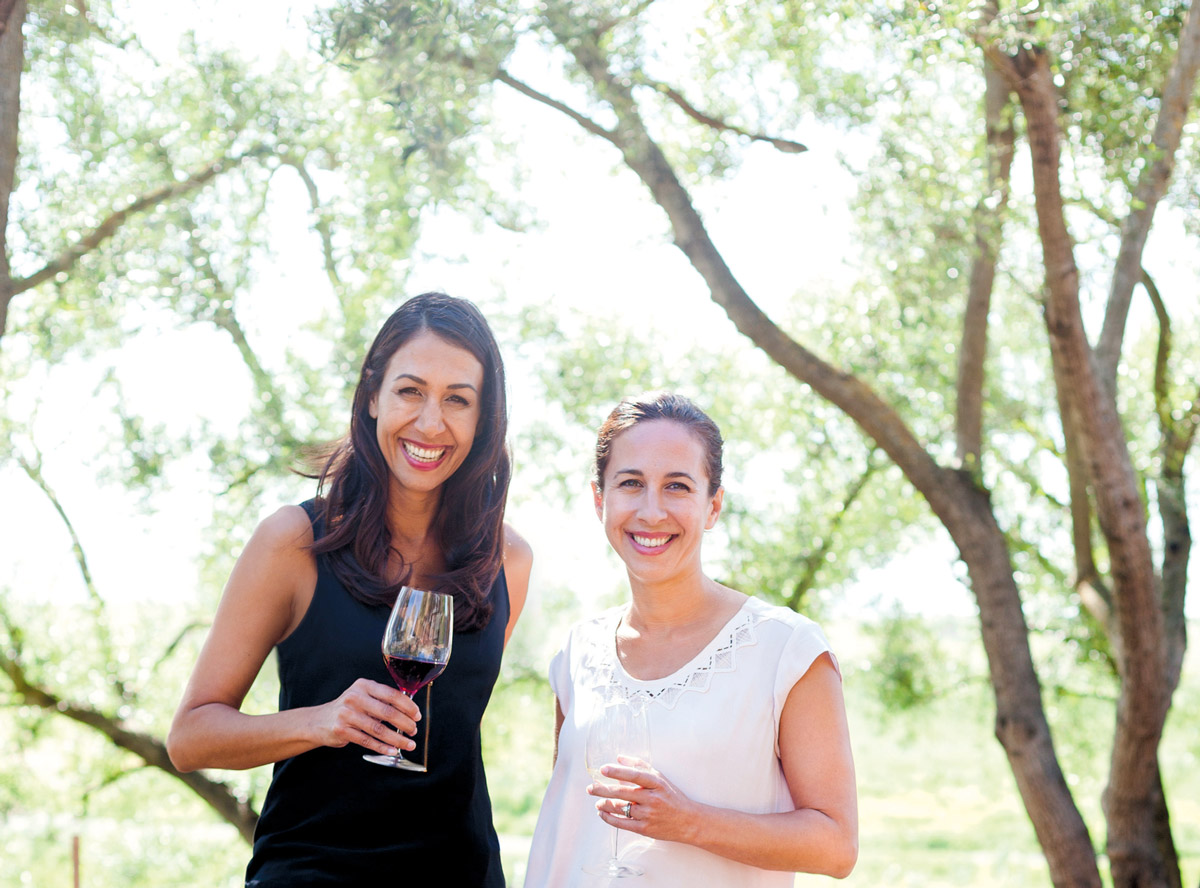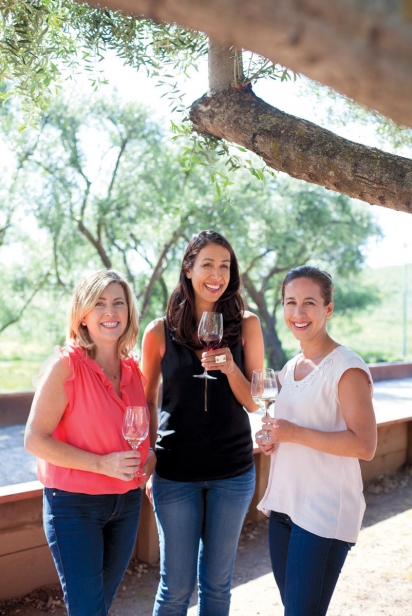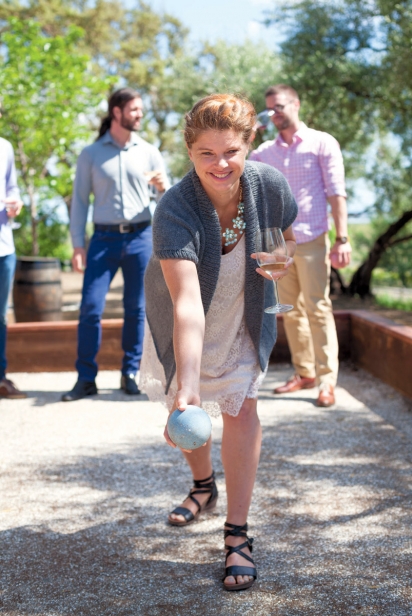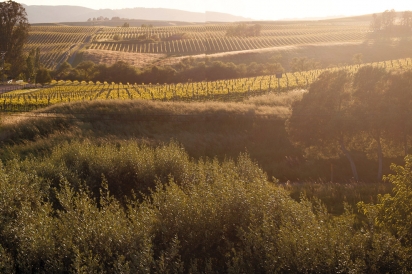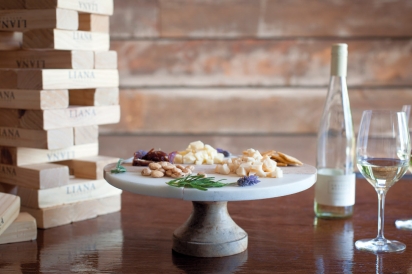The Next Generation Finds its Place
LISA AND ARIANA PEJU’S LIANA ESTATES
It’s a breezy blue afternoon and I’m looking out over an expanse of vineyards that stretch down to the Bay, coupe of blanc de blanc in hand. As Mondays go, mine couldn’t get much better. What brings me to this near dream state is Liana Estates, a gem of a winery that seems to have bubbled up out of nowhere in 10 short months, just a mile off Highway 12 in the Carneros region of Napa.
Liana is an amalgamation of the names of its two cofounders, sisters Lisa and Ariana Peju, the dynamic duo responsible for the winery’s blossom from concept to reality in record time. And, in case you were wondering, yes, they are the daughters of Tony and Herta Peju, founders of St. Helena’s Peju Province winery.
Ariana’s quick smile lights up her face as she describes a childhood running through the vineyards, helping with crush from the time she could walk, falling in love with the region and the wine business and feeling an innate sense of purpose that has never left her. Lisa was right alongside her, adding, “We grew up watching our parents realize their passion and go from hosting small tastings in our garage to building a beautiful winery and tasting room.”
From a very young age, there was no question that Lisa and Ariana were destined to work in the industry; to have their very own winery is a dream come true, but not a surprise in the least. After all, the model for success is their parents, who decided to abandon “sensible careers” in Los Angeles and sink their life savings into the more, well, “intoxicating,” world of winemaking. “One of the things I admire most about my parents is their dedication and vision,” Lisa says, and it looks as though those same qualities have been passed down to the next generation: Lisa and Ariana have the same courage when it comes to risk-taking, fortified by a few decades of experience already under their belt.
As we tour the grounds, complete with ample picnic areas, a wine club members’ gazebo, bocce ball courts, a rustic barn used for events and that knockout view, Ariana describes the arduous process of starting, or purchasing, a winery (in case you were considering it…).
She and Lisa started their search with broad geographic parameters, even considering a move to Oregon or Washington. Their first bid on a property was not accepted. It seemed like a setback, but, as Ariana put it, “things happen for a reason.” The Carneros property where Liana now stands previously housed Acacia Vineyards and came with a built-in winery and 100 acres planted to grapes. “It stole my heart,” adds Lisa. “Carneros really feels like what Napa was 30 years ago.”
Once the property was theirs, they began an extensive makeover to completely transform the existing winery structure into what is now Liana’s tasting room and winery – in just 10 months. If this seems quick, that’s because it is: “I can barely remember the last year,” Ariana laughs.
As we meander up a gravel road by the barn, Ariana sweeps her arms up and around, describing the members’ private tasting house she wants to build, the landscaping she wants to do, the visions that have yet to materialize but—judging by their track record—undoubtedly will. These aren’t just whims, but strategically constructed plans designed to take full advantage of the location and do justice to the Carneros region. According to Lisa, “Everything we do at the winery is so driven by our location. All of the food is sourced from Carneros, our renovation was inspired by the region’s feel and we host as many tastings as we can outside, so that our guests can enjoy our amazing view and the breeze off of San Pablo Bay.”
It’s that clear-eyed vision, coupled with an innate sense of what’s trending, that has allowed Lisa and Ariana to position Liana as a winery at the forefront of the industry. The tasting room is wide and flooded with light; two glass-paneled walls on either side of the bar open up to let the outside in, as does a roof panel above a cozy leather booth that Ariana and I settle into for lunch.
As we sip our Viognier (fruity and tropical, surprisingly light and a touch dry), Chef Alex Espinoza presents beautiful plates of seared albacore salad with radishes and avocado on a bed of Little Gem lettuce.
Enjoying the talents of Chef Spinoza is one of the many benefits of having close ties to a larger winery: He also works for Peju. When either winery is booked for an event, the chef is in the kitchen—sometimes both on the same day. It’s clear that the chef and Ariana are true friends, as he teases her about the piece of albacore she left on her plate and she asks about his wife, who is pregnant.
The blurring of lines at Liana—exterior/interior, professional/convivial, upscale/casual—is one of the reasons this second generation’s take on the consumer’s winery experience works so beautifully. You have the $35 tasting fee (and the quality wine) of a high-end winery, in the atmosphere of your cool friend’s gorgeous backyard. You can sit in the tasting room, enjoying the cheese plate that accompanies each tasting flight, and at the same time watch the winemakers at work through the glass-paneled back wall that looks straight into the cellar. It’s a place where you don’t have to choose, you just have to sit back and enjoy the experience.
Enjoyment isn’t hard to come by when the wine is as good as the décor. The property came with 40 acres of Pinot Noir and 20 of Viognier, but Lisa, Ariana and Liana’s winemaker Sara Fowler also like to dabble in what they dub “the lost grapes.” Funky, little-known or even forgotten varietals like orange Muscat (one of my new personal favorites) are sought out by Sara, who has free rein to exercise her creativity in the cellar. According to Lisa, “The motivation behind our ‘lost grapes’ is really to give an incentive to vineyard owners to keep growing these lesser-known varietals and to let our guests expand their palates.”
Of course, Carneros classics Chardonnay and Pinot Noir are well-represented by wines that beautifully express the region’s terroir and showcase Sara’s finesse as a winemaker, but the ability to add a little playfulness and creativity to their wine roster is something that brands Liana as distinctly young and hip—and the crowd they draw reflects that. As we finish our lunch and move on to taste the Pinot Noir, a large group of predominantly 20-somethings streams in on what appears to be a company outing. Tasting flights are poured and the wine is presented to a rapt audience. And then the music is turned up, cheese plates start coming out of the kitchen and a game of oversize Jenga starts up. The perfect balance between a good time and an educational experience, enabling the ability to savor and consider wine in a setting that’s relaxed and fun.
When asked if the appeal to millennials was intentional, Ariana answers, “People are seeking places out that are unusual, that are different. We wanted to appeal to a younger demographic than Peju, because Lisa and I are a younger demographic.” And it rings true. The experience is saturated by authenticity, by someone who feels akin to millennials rather than someone trying to target them. At the same time, it’s not overdone.
The respect for the wine itself and the tradition of winemaking remains intact, as does an understated elegance that feels timeless. For instance, the décor may be trendy, but it is also functional. An on-trend moss wall hanging comes from moss gathered on the property; wood salvaged from fallen 100-year-old oak trees is used for furnishings.
As we step outside, Ariana is still firing off plans for the future: yoga sessions, oyster parties, cupcake and popcorn pairings, stargazing … the list runs long and embodies the life of Liana. It’s about the experience.
What Ariana says she loves about wine is its ability to bring people together; that’s exactly what she and Lisa have done with Liana. You can taste the estate’s wine and move on to explore the rest of the Carneros region, but you can also bring a picnic, spread out a blanket on the lawn, play a few games of bocce ball and watch the sun slide into the bay. As Lisa puts it, “We want to create a space where people feel comfortable to just come, buy a bottle and hang out.” Liana is a place where tourists can feel like locals, and locals can become regulars. It can be your gateway to wine country, your warm introduction to the Napa Valley, or it can be your final savor on the way home. Whenever you visit, I would leave time to linger. Enjoy the view, delight in the wine, and soak up the beautiful positive energy that fills the space.
Like most business ventures, Liana is a product of luck, circumstance and connections. But it would not exist without the razor-sharp business sense, keen eye for design and tireless work ethic of the Peju sisters. They have their finger on the pulse of where the wine industry is heading, and are brave enough to listen to their intuition. What they’ve created is more than just another wonderful addition to our region’s wine offerings. It’s an embodiment of what’s to come in the wine industry at large, a gathering place founded on the idea of conviviality, celebration, community and life itself. At its heart and soul, Liana is the product of women doing many of the things that women do best: working hard, enjoying life and turning dreams into reality—all at the same time.


